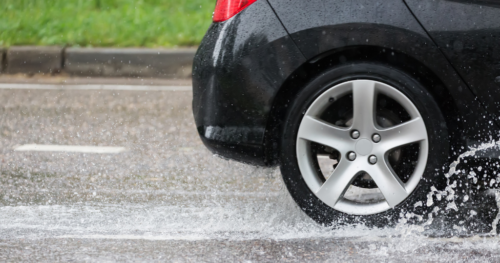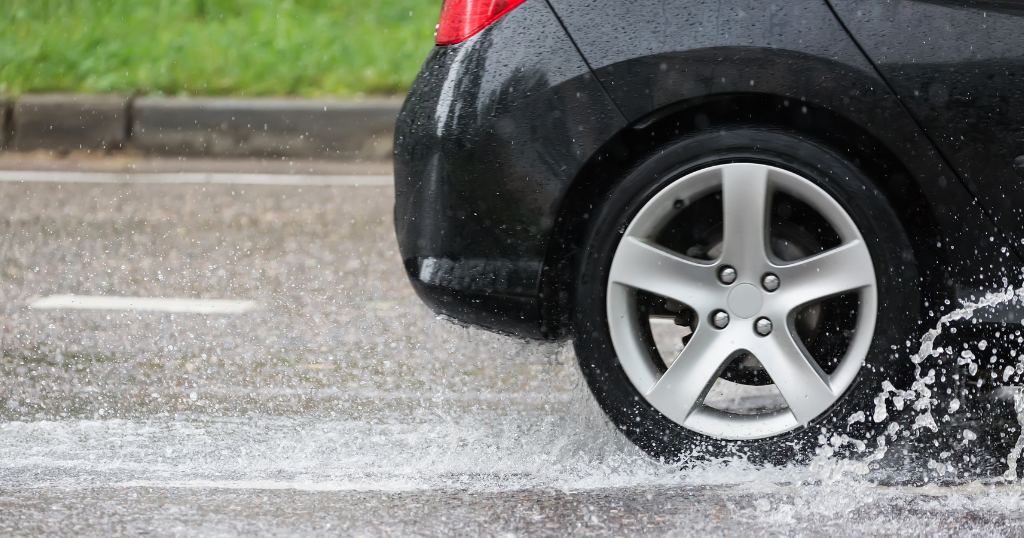
Driving in Florida often means navigating wet roads during or after intense weather. It’s not uncommon for drivers to experience skidding and temporary loss of control due to hydroplaning. A 2022 study found that about 87% of hydroplaning risk events happen in the Southern U.S., with Florida being one of the top six states for hydroplaning events.
While hydroplaning is alarming, being in a car accident as a result can be frightening. This raises an important question: if your car hydroplanes and you lose control through no fault of your own, can you still be held liable for an accident?
Learn how excessive speed or risky driving in wet conditions can influence liability decisions. Speak with a Miami car accident lawyer from Aigen Injury Law, who can help you understand your position and options after a hydroplaning accident.
What is Hydroplaning?
Hydroplaning happens when a vehicle’s tires lose contact with the pavement due to water on the road. Car tires are designed to move water away, maximizing grip and minimizing slipping and hydroplaning risks. If tires can’t disperse water effectively or lose road contact, they may lift off the surface, leaving you unable to steer, brake, or control the car.
A road doesn’t need to be flooded for a vehicle to hydroplane. Even a thin layer of moisture can mix with the oil residue that often accumulates on road surfaces, creating a slick and treacherous condition.
Hydroplaning is influenced by many factors, such as:
- Speed: Driving at high speeds increases the likelihood of hydroplaning. The faster you go, the harder it is for your tires to channel water away effectively.
- Tire tread depth: Worn-out tires with inadequate tread depth, typically 2/32 of an inch, cannot displace water efficiently, increasing the risk of hydroplaning.
- Water depth and accumulation: Heavy rain or standing water of more than 1/10 of an inch on the road is more likely to induce hydroplaning.
- Tire pressure: Underinflated tires, below 32 to 35 PSI for most passenger cars, may increase the risk of hydroplaning.
- Vehicle weight: Lighter vehicles, like compact or sports cars, are more likely to hydroplane than trucks or SUVs.
Can You Be Held Liable if Your Car Hydroplanes and Causes a Crash?
In Florida, injured parties in a car accident first claim from their personal injury protection insurance (PIP). But if the injuries are serious and PIP doesn’t cover all the costs, the driver at fault might have to pay the rest through their own insurance or in court.
Hydroplaning is typically considered a weather-related incident, not the driver’s fault. But there are some situations where the driver could be held responsible. These include:
- Negligence: If you were driving recklessly, excessively speeding, or engaging in other negligent behavior despite known adverse weather conditions, you may be partially or wholly liable for an accident caused by hydroplaning.
- Poor maintenance: Failing to maintain your vehicle properly, including neglecting tire maintenance, can lead to a higher risk of hydroplaning. You could be held liable if your negligence in vehicle maintenance contributed to the accident.
- Modified comparative negligence: Under Florida’s modified comparative negligence law, fault in an accident is determined by each party’s level of responsibility. If you are partially at fault, your compensation decreases accordingly. You cannot receive damages if you are more than 50% at fault.
How to Avoid Hydroplaning on the Road
You must adapt your driving behavior in wet conditions to avoid hydroplaning and minimize your liability risk in a crash. Here are tips for preventing this situation on the road:
- Lower your speed. Driving at reduced speeds helps tires displace water more effectively. Slow down, especially in the first minutes of a rainstorm, when roads are slickest.
- Maintain your tires. Regularly inspect and maintain your tires to ensure they have enough tread depth and are properly inflated to manufacturer specifications.
- Avoid standing water. Try to avoid puddles and areas of standing water on the road.
- Increase following distance. In wet conditions, keep a greater distance from the vehicle in front of you, around 5 to 6 seconds. This gives you more time to react, which is important due to reduced visibility and slippery roads.
- Apply brakes gently. Brake softly and gradually on wet roads. Hard braking can lead to loss of tire traction and increase hydroplaning risk.
- Avoid cruise control. Control your speed manually in wet conditions. Using cruise control can delay your response time in case of hydroplaning.
- Follow tire tracks. When it’s safe to do so, follow the car’s tire tracks in front of you. These paths can be less waterlogged, reducing the risk of hydroplaning.
What to Do if You are in a Hydroplane-Involved Accident
If you’re involved in an accident due to hydroplaning, prioritizing safety is essential. To protect yourself and everyone else involved, do the following:
- Assess the situation. First, check yourself and your passengers for injuries. If possible, move to a safe location away from traffic.
- Contact authorities. Call 911 to report the accident and request medical assistance. This is required for accidents that cause $500 in damages, injury, or death in Florida.
- Exchange information. Exchange contact and insurance information with the other parties involved in the accident.
- Document the scene. Take pictures of the accident scene, including road conditions, skid marks, and vehicle damage.
- Seek medical attention. Even if you initially feel okay, get a medical check-up, as some injuries might not be immediately apparent. This helps you get the care you need and document your injuries.
- Consult an attorney. Consult a qualified Miami car accident attorney from Aigen Injury Law. We can investigate the cause of the crash to help you minimize liability or prove the other driver was responsible so you can obtain compensation for your injuries.
Get Legal Representation After a Hydroplaning Car Accident
If you’re involved in a hydroplaning accident, seek legal counsel. At Aigen Injury Law, our car accident attorneys conduct comprehensive investigations into hydroplane accidents, often enlisting the help of professional accident reconstruction specialists.
We gather crucial evidence, including the official police report, witness statements, and video surveillance, to accurately determine and demonstrate fault.
Contact us for a free consultation to discuss your case and learn your legal options.
